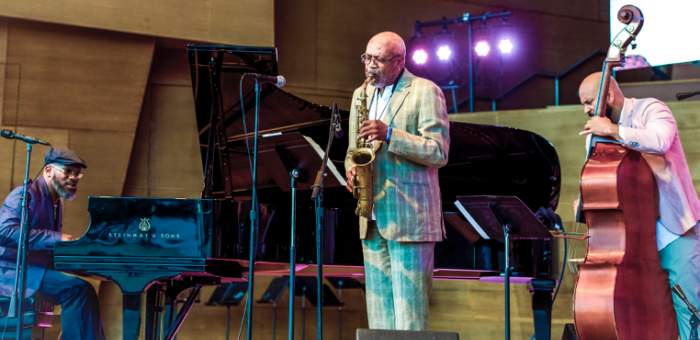Jan 13, 2026 2:09 PM
More Trump-Kennedy Center Cancellations
The fallout from the renaming of the John F. Kennedy Center for the Performing Arts to include President Donald…

Orrin Evans (left), Oliver Lake and Eric Revis perform as Tarbaby on Sept. 2 at the Chicago Jazz Festival.
(Photo: Michael Jackson)The band Tarbaby delivered a powerful set at the Jay Pritzker Pavilion on Sept. 2 as part of the Chicago Jazz Festival. The jazz world has not seen or heard much of Tarbaby since its third album, The Ballad Of Sam Langford (HiPNOTICS) was released in 2013. The three core members and co-leaders—pianist Orrin Evans, bassist Eric Revis and drummer Nasheet Waits—have been busy leading their own projects and being sidemen on numerous albums. The headlining set in Chicago, where they were joined by alto saxophonist Oliver Lake, provided ample evidence that the group is nowhere close to calling it quits on this eclectic project.
Throughout the hour-long set, the band offered fiery resilience. Ascending sax calls and heavy, exploding drums fueled a program that blended the loose energy of the avant-garde with the driving swing of post-bop, all delivered with a sense of unpredictability.
With each musician intent on creating intriguing rhythms and textures, the overall sound of the quartet was muscular yet supremely intricate. The band’s complex, dense rhythms immediately draw listeners in, but the exploratory improvisation is what holds their attention. While this is true when spinning a Tarbaby album, the effect was more pronounced at this concert.
After a period of not playing together much recently, the four musicians seemed to have a lot to say. The band simmered throughout the set, requiring only a little more heat from any member to make the proceedings boil over with brilliant intensity. Each member constantly pushed the other three, resulting in a quartet that soared higher and higher, with a bold spiritual vibe.
The more raucous tunes were certainly the most memorable, but a few ballads, sandwiched between the dense uptempo numbers, conveyed a unique, raw beauty. While the set was generally charged and featured visceral reactions, the ballads provided moments for introspection.
Tarbaby concluded with a ballad, which began with Evans accompanying himself on piano as he sang a song of love, peace and goodbyes. This provided a stark contrast to an earlier number that featured an entirely different kind of vocals: guttural screams from every member.
It was clear the set had underlying and programmatic themes, and, given the band’s name, perhaps reflected a fury regarding racial and social injustice.
Prior to Tarbaby’s exhilarating performance, Brian O’Hern and his big band, the Model Citizens, offered a different type of collective heat. O’Hern, a Chicago native, has been leading the Model Citizens, a traditional yet atypical big band, for the past 20 years. The ensemble is rooted in classic big band styles but O’Hern also injects quirky, tasteful satires of those same styles.
The show featured original compositions and arrangements from O’Hern, including tunes from the band’s 2016 disc, We Are So Straight Ahead. The leader peppered the set with his clever, deadpan introductions. While the band was impressively tight, there was also a charming wonkiness present, along with delightfully over-the-top sax solos.
Frank Zappa would be proud of the intoxicating mix of musicality and humor O’Hern and the Model Citizens provided. Although O’Hern clearly felt the show went well, before the final tune, he jokingly asked, “Are we hired? Did we get the gig?”
On the festival’s final day, Sept. 4, the evening shows at Pritzker Pavillion began with Michael Zerang and the Blue Lights, an ensemble of contemporary “outside” jazz stars. Zerang, a Chicagoan, played drums alongside reedists Mars Williams and Dave Rempis, bassist Kent Kessler and cornetist Josh Berman on cornet. The Blue Lights triumphantly sounded like a full big band rather than a quintet.
The group’s set drew upon many influences including bebop, free-jazz and Middle Eastern music. Much of the world music influence came from Zerang, whose Syrian father exposed him to this traditional music as a child. With razor-sharp compositions as enticing as the wild solo sections, the set undoubtedly won the group new fans while also wonderfully nudging some listeners out of their comfort zones.

Belá Fleck during an interview with Fredrika Whitfield on CNN.
Jan 13, 2026 2:09 PM
The fallout from the renaming of the John F. Kennedy Center for the Performing Arts to include President Donald…

Peplowski first came to prominence in legacy swing bands, including the final iteration of the Benny Goodman Orchestra, before beginning a solo career in the late 1980s.
Feb 3, 2026 12:10 AM
Ken Peplowski, a clarinetist and tenor saxophonist who straddled the worlds of traditional and modern jazz, died Feb. 2…

The success of Oregon’s first album, 1971’s Music Of Another Present Era, allowed Towner to establish a solo career.
Jan 19, 2026 5:02 PM
Ralph Towner, a guitarist and composer who blended multiple genres, including jazz — and throughout them all remained…

Rico’s Anti-Microbial Instrument Swab
Jan 19, 2026 2:48 PM
With this year’s NAMM Show right around the corner, we can look forward to plenty of new and innovative instruments…

Richie Beirach was particularly renowned for his approach to chromatic harmony, which he used to improvise reharmonizations of originals and standards.
Jan 27, 2026 11:19 AM
Richie Beirach, a pianist and composer who channeled a knowledge of modern classical music into his jazz practice,…